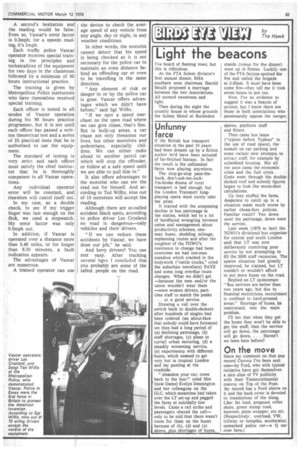Unfunny farce
Page 35

If you've noticed an error in this article please click here to report it so we can fix it.
If the British bus transport situation in the past 10 years had been dreamt up by a fiction author he'd have been accused of far-fetched fantasy. In fact the result is the unfunniest farce now playing anywhere.
The stop-go-stop pass-thebuck, don't-ask-me-JackI'm-broke drama of rural transport is bad enough, but the London Transport longplaying opera must surely take the prize.
It started with the steepening decline in bus patronage in the sixties, which led to a lot of hardfaced wrangling between union and management about productivity schemes, oneman buses, shedding mileage, replanning routes and after the toughest of the TGWU's resistance to change had been overcome we had one-man standees which cracked in the bodywork ("cattle trucks," cried the suburban travellers) PAYE and some long overdue route changes. What we didn't get — because the men and/or the union wouldn't wear them
— were women drivers, parttime staff to match the peaks . . . or a good service.
Drawing a veil over the switch back to double-deckers after hundreds of singles had been ordered (an about-face that nobody could have foreseen) we then had a long period of (a) declining patronage, (b) staff shortages, (c) plans to curtail urban motoring, (d) a steadily worsening service, (e) experiments with different buses, which seemed to get very hot in tropical London and lay panting at the roadside.
"Abandon your car; come back to the bus 1" cried Mrs (now Dame) Evelyn Dennington and her colleagues on the GLC, which meantime had taken over the LT set-up and pegged the fares at suicidally low levels. Came a rail strike and passengers obeyed the call— only to be told 'that there wasn't room for them on the buses because of (b), (d) and (e) above, plus shortages of buses, spares, platform staff and fitters.
Then came bus lanes ("typists before Typhoo" in the use of road space), the assault on car parking and some valiant new attempts to attract staff, for example by subsidised housing. But all too soon came the economic crisis and the fuel crisis. Costs went through the double• decked roof and subsidy figures began to look like moon-shot calculations.
Up they stuffed the fares, desperate to catch up in a situation made much worse by earlier cheap-fare policies. Familiar result? Yes: down went the patronage, down went the service.
Last week (1976 at last) the TGWU's divisional bus organiser for central and south London said that LT was now deliberately contriving poor service by not attempting to fill the 3000 staff vacancies. The spares situation had greatly improved, he claimed, but LT couldn't or wouldn't afford to put more buses on the road.
Replied an LT spokesman: "Bus services are better than two years ago, but due to financial restrictions, recruitment is confined to hard-pressed areas." Shortage of buses, he maintained, was the main problem.
I'll bet that when they get the buses they won't be able to get the staff; then the service will go down, the patronage will go down. . . Haven't we been here before?
















































































































